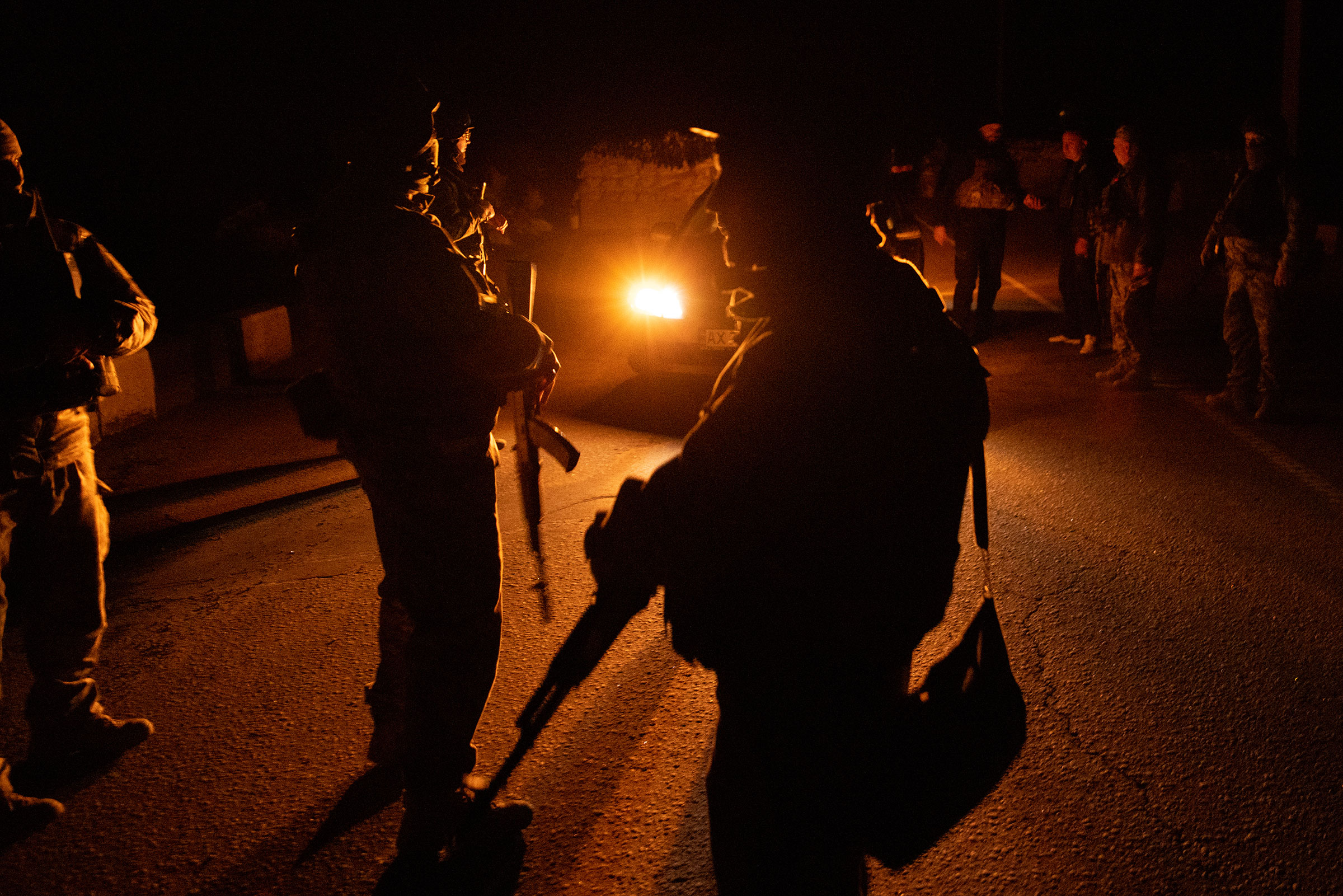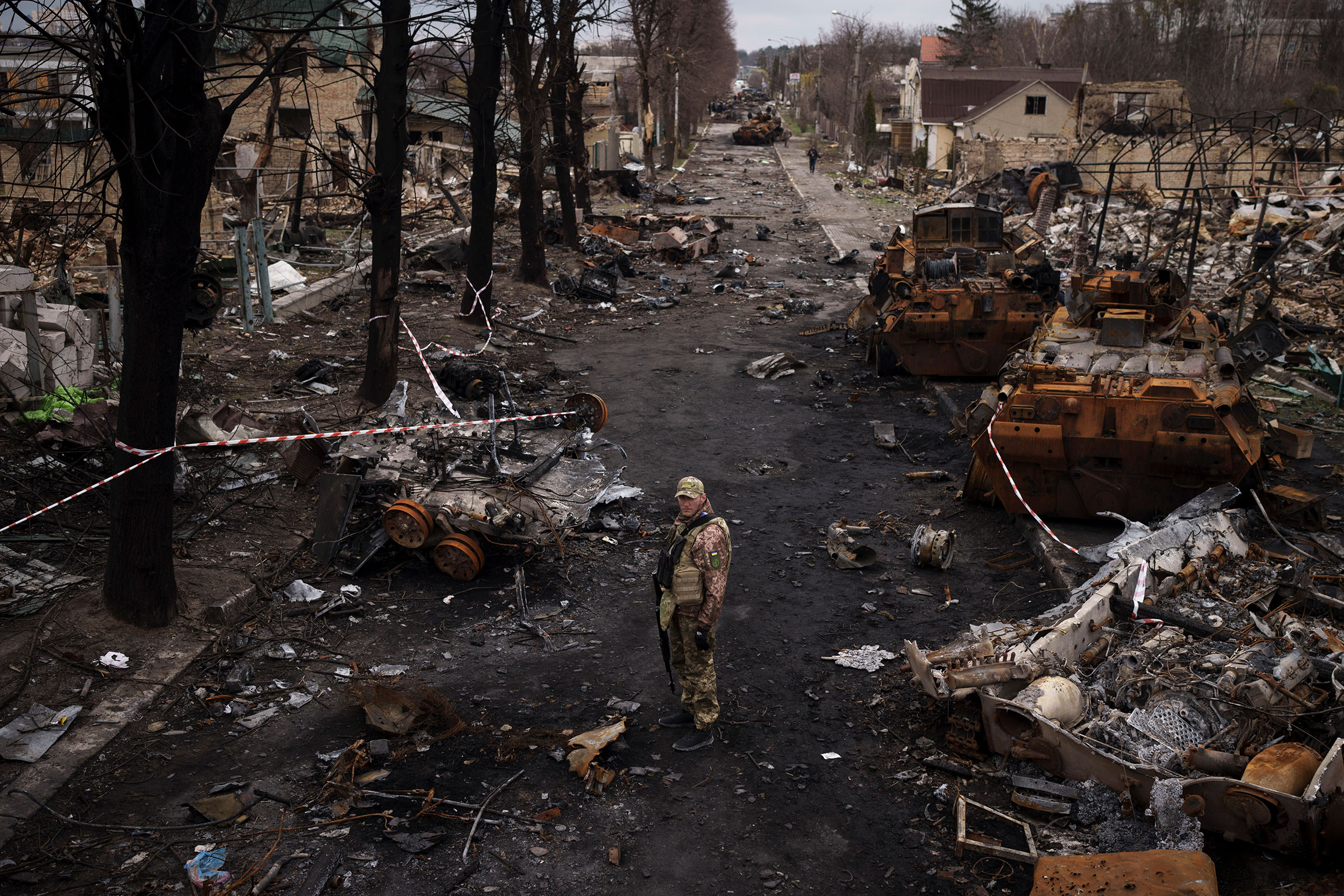
A war within a war has emerged in Ukraine. More than a month after the Russian army invaded on the order of President Vladimir Putin, more and more Russian nationals are fighting alongside Ukrainians.
The combatants, who appear to number in at least the hundreds, describe Putin as the enemy, even as they take up arms against their countrymen. They range from captured Russian soldiers to political dissidents like the 30-year-old Russian who asked to be called Yan, an IT worker who now spends his days scouting, identifying potential artillery targets and bringing medical supplies to Ukrainian soldiers on the front.
“No Russian should have crossed the border with a weapon in his hand,” Yan tells TIME from a district near the Ukrainian capital, Kyiv, where he has served in the country’s territorial defense forces since the war started at the end of February. “I am here to oppose Russian aggression and also defend Ukraine.” He produced a valid Russian passport but requested the pseudonym out of fear for the safety of his family in Russia. He said he moved to Kyiv from Russia’s Ural mountains three years ago, fearful of imprisonment after his office was raided. A self-described anarchist, Yan had taken part in demonstrations against Putin’s rule.
“Vitya” is the nom de guerre chosen by a 25-year-old Russian political science student who said he also joined the Ukrainian territorial defense forces to continue his fight against the Russian government, having attended anti-government protests in his native Moscow since his early teens. “I love my motherland,” Vitya says from Kyiv, where he is stationed. “Hopefully this war will break the political regime. I would like to return home one day.” He said his parents, who are in the Russian capital, know their son is in Ukraine but think he is donating blood and helping the Ukrainian war effort in other ways.
But if some Russians fighting beside Ukrainians were challenging Putin well before the invasion, the conduct of the war has brought in others–deepening existing fissures in Russian society and likely further demoralizing the country’s military. In the first weeks of the war the force was criticized for its battlefield performance, struggling to advance on the capital and even to maintain supply lines. As it retreated from the suburbs of Kyiv, evident atrocities against Ukrainian civilians were revealed on the ground it had held, and Russia’s military now also faces allegations of war crimes.
Ukraine’s government, which has cast the war as a contest between the forces of darkness and light, is leveraging Russian disunity. On April 5, three men wearing military fatigues and black balaclavas faced reporters in Kyiv, where they announced a new battalion called “Freedom for Russia,” composed entirely of Russian citizens, including former POWs. Addressing their fellow Russians, they said they were morally outraged by Moscow’s lack of discipline and apparent disregard for human life.
One of the unnamed men said the Russian government had tricked them into going to a sovereign country to carry out what he described as “genocide.” After he was taken prisoner – and later released – by Ukrainian forces, he switched sides to fight for Ukraine. “We were told propaganda. But there are no fascists here, no Nazis, but a civilian population,” he said. “I want to fight this lawless Putin regime so people can speak and breathe freely.”

Sounding indignant, he said he witnessed first-hand the atrocities committed by the Russian army in Bucha, Irpin and Kharkiv. It was images and reporting emerging from Bucha, a commuter town near Kyiv, showing mass graves and streets strewn with dead civilians that prompted President Joe Biden to call for a war crimes charges to be brought against Putin.
A second speaker described himself as a sergeant in the Russian special forces. Condemning the widespread looting of Ukrainian civilians’ homes by marauding soldiers, he urged other Russian forces “to lay down your arms and fight for your future.”
As the masked men spoke, a sign on the table offered instructions for donating to the battalion using cryptocurrency. The unit also has a Telegram channel, which urges Muscovites to attend anti-war protests and includes instructions for Russians wishing to join their legion (“sign up at a Ukrainian embassy in a nearby European country”). On their camouflage sleeves the men wore the white-blue-white flag that has become symbolic of Russia’s anti-war movement.
Russian defectors are also welcome in Kyiv. On April 2, Ukrainian parliament passed a new law saying any Russian soldier who surrenders with a warship or jet will be awarded $1 million. A captured tank will earn them $100,000 and there is $10,000 for smaller military equipment. The first vice-speaker of the Ukrainian parliament, Oleksandr Kornienko, said the rewards would motivate the “demoralized occupying army”. The law comes after a previous offer by Kyiv of $10,000 to any Russian soldier who surrenders. In late March, Ukrainian authorities said hundreds of Russian soldiers had deserted their army.
Inside Russia, the extent of support for the war is difficult to determine. Russians face heavy consequences for protesting or vocally opposing Russia’s invasion of Ukraine. Though recent public opinion polls show over 80 percent of Russians view Putin favorably, many may be fearful of expressing their true opinion when new censorship laws can send people to jail for up to 15 years for “fake” news about the war, including using the very word “war” to describe what is officially known as a “special military operation.”
The Ukrainian government has openly welcomed foreigners to their fight. Since President Volodymyr Zelensky established an “international legion” to defend Ukraine at the start of the war, an estimated 20,000 people from 52 countries, from the United States to Denmark, have signed up. The “Freedom for Russia” members declined to say how many men belonged to their battalion, except to describe it as “large” and claim they had received over 300 applications to join in a single day.
Yan, the IT professional, said his platoon of around 40 men in Ukraine’s territorial defense forces contains several other Russians, and he knows of more in other parts of the country. “There is a reasonable number of us across Ukraine,” he says, adding that, while Russians in the Ukrainian armed forces are generally well tolerated, there are also a lot of jokes told at their expense.
“And why not, you know? Ukrainians are going through huge psychological trauma so this is totally understandable. I am not offended.”
More Must-Reads from TIME
- Cybersecurity Experts Are Sounding the Alarm on DOGE
- Meet the 2025 Women of the Year
- The Harsh Truth About Disability Inclusion
- Why Do More Young Adults Have Cancer?
- Colman Domingo Leads With Radical Love
- How to Get Better at Doing Things Alone
- Michelle Zauner Stares Down the Darkness
Contact us at letters@time.com